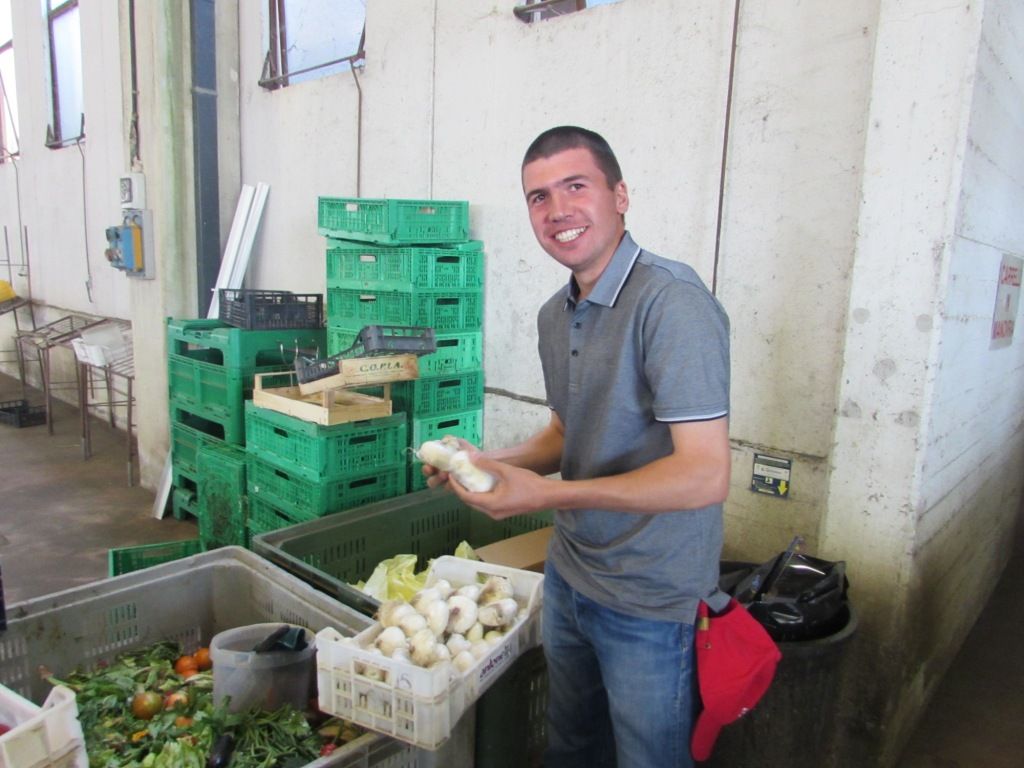
Georgian Farmers Share the Experience of Italian Colleagues
According to Georgian farmers: “The secret of success of Italian farmers’ cooperatives lie in their mutual trust and cooperation.”
Tornike Kapanadze is a young farmer from Bolnisi. Together with the 8 like-minded people he has established an agricultural cooperative “Migrino” in the village of Khatissopheli several years ago. The cooperative is engaged in onion farming and provides agricultural services. About a year ago the cooperative has participated in the ENPARD grant competition process. The business plan of the cooperative was positively evaluated by the “Action Against Hunger”- partner organization of the European Union and in the framework of the EU grant competition the cooperative was provided with a technical support of 49.000 EUR with a 30% co-financing from the cooperative.
Members of the cooperative “Migrino” believe that it is absolutely necessary to establish innovative practices of the EU member states in the sphere of agriculture in Georgia. TornikeKapanadze has participated in a study agro tour in Italy.
In the framework of the European Neighborhood Programme for Agriculture and Rural Development (ENPARD)Spanish international humanitarian organization – fund “Action Against Hunger” (ACF) has organized a study tour to Italy. The representatives of the regional branch of Kakheti of the Ministry of Agriculture, 10 farmers who represent the cooperatives from the sphere of viticulture, apiculture, vegetable and potato production from the region of Kvemo Kartli, Kakheti and Samegrelo have participated in the visit. Georgian delegation was hosted by the organizer of the study tour Mr. Lorenzo Venzi, Professor of the Tuskia University. The study tour aimed to share the experience of Italian cooperatives, introducing modern innovative technologies in the process of food processing and storage of their production to Georgian colleagues. In the framework of the study tour group members have visited cooperatives working in various fields, such as apiculture, fruit, vegetable, potato, hazelnut, wine and grape production.
According to TornikeKapanadze, the most interesting for Georgian cooperative representatives was introduction to the value chain of Italian farmers. “Almost all cooperatives are united under the second level cooperative. Each cooperative has up to 100 members and some of them are even more numerous. Second level cooperatives have whole processing cycle established – besides growing crops in the greenhouse, cooperatives take care of storage of the production, packaging, branding and sales. Such cooperatives produce the production of the same quality and they guarantee uninterrupted supply of the supermarket chains thus their brands are well-established”-Tornike says.
One more member of the study tour, farmer KakhaTolordava, who is a head of the cooperative “MukhurisTafli” tells us about his perspective on success of Italian cooperatives: “One of the reasons of success of Italian colleagues originates from mutual trust and partnership based relationships. Besides that the number of the cooperative members causes the increase of production, which is very important for the market. The European Union supports financially cooperatives. State also supports cooperative movement through regulations adjusted to cooperatives. For example, if the number of cooperatives exceeds 100, the cooperative is exempted from number of taxes, which supports the strengthening of the cooperatives.”
Organizer of the study tour, representative of the “Action Against Hunger” Tamar Naskidashvili says that it was obligatory for state representatives to participate in the study tour, in order for governmental sector to share the successful practices of the Italian agricultural production.The deputy head of the Kakheti regional office of the Ministry of Agriculture Ms. NatiaTatishvili has participated in the study tour along with farmers for the purpose of getting acquainted with the activities of cooperatives in the country. The regional office was actively involved in the organizational issues of the study tour and has established great work relationships with the host organization. Natia says that Italy has managed to create a successful model of farmers’ cooperatives. This was the reason for choosing Italy as a field for study tour and finding ways for transferring their experience to Georgia. “Cooperatives in Italy have strengthened since the time they united under second level cooperatives and broadened production cycle. Italian farmers were supported by the government in the process. For example, if the cooperative has more than 100 members, it has an easier access to various state grant programmes and enjoys exemptions from certain taxes. There are programmes for supporting second level cooperatives in Georgia but cooperatives are in need of further strengthening and enlargement. Creation of the second-level cooperatives should be one of the priorities of the agricultural sphere”, says NatiaTatishvili.
It should be noted that cooperatives in Italy have long history as the cooperative movement was the factor that has assisted economic revival of the country in the second half of the 19th Century. Cooperation is being practiced in Italy for 120 years now. First cooperative was created in 1854 there with the idea to decrease production costs of the members involved in agriculture. In 1922 along with the strengthening of the Nazi regime, cooperative movement was suspended due to the fact that Nazi ideology was against cooperation in any form. After the Second Word War the cooperation still strengthened and second and third level cooperatives were created, which were oriented at the industrial production.
Strengthening of the cooperatives in Italy was supported by the state regulations. There were certain limits introduced in terms of profit distribution among cooperative members and this factor has played a role against division or selling of many cooperatives. All the factors were reflected in capital accumulation which has assisted long-term and sustainable development of the cooperatives. Nowadays 60% of social services in Italy is delivered to the public through social cooperatives and 62,4% of Italian agricultural production is produced by the cooperatives.

